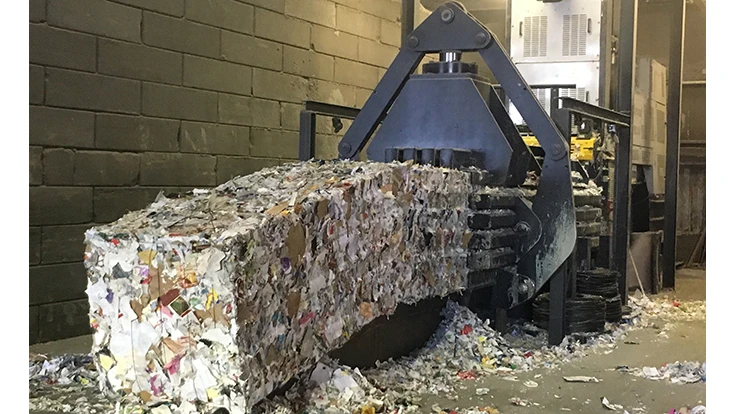
Recyclers in late September 2017 are reporting having difficulty finding any buyers for mixed paper grades, and prices for all grades are showing signs of plummeting as the month passes.
A material recovery facility (MRF) operator based on the U.S. East Coast says Sept. 21 that it’s a mess, “and mess would be a kind word.” He says he has not received any orders for mixed paper in China.
A large exporter based on the U.S. West Coast tells Recycling Today his company is “in a quandary.”
In mid-September, scrap paper sellers in Hong Kong began reporting prices as being slashed in half, as well as having difficulty making any sales to mills in the People’s Republic of China. For several days in mid-September, member companies in one Hong Kong recycling organization stopped collecting fiber—allowing it to pile up in shops and warehouses—as a way to get the government’s attention to the matter.
By the middle of the week of Sept. 18-22, it was becoming clear to traders in other parts of the world that the September market was going to be a difficult one. A trader based in the Netherlands tells Recycling Today, “Prices are dropping over here and none of the Chinese buyers is in the market.”
Sources in the United States are offering similar portrayals of the market, with one recycler in the southeastern United States saying prices for mixed paper are nearing zero.
“Prices have dropped significantly and orders have dried up,” says the MRF operator based on the U.S. East Coast. “It’s not a situation of where you’re worried about the price, it’s a situation of who can take it, who can move it. I think there are going to be a lot of companies who are going to have challenges staying in business.”
The West Coast-based exporter says, “Mills don’t know when it’s going to loosen up. ... It’s a little confusing right now.”
He says his company quit selling mixed paper to China a while ago and anyone attempting to sell this grade into that country is “taking a huge risk.” Other markets his company has since sold mixed paper to include Vietnam, Indonesia and Korea. “They're all buying mixed paper now,” he adds.
Causes of the price drop are focusing on China, with rumors swirling that major Chinese mill buyers are staying on the sidelines until the scrap import license situation for the rest of 2017 and into 2018 becomes clearer.
“We don’t know when China may come back into a buying mode. I know that they are paying more because of these import license issues than they want to because they have to get it from other sources and are paying a premium,” says the East Coast-based MRF operator.
“Prices are going through the roof because they can’t get material outside of China. It’s hurting Chinese workers,” he adds.
The MRF operator says his company has taken actions recently to clean up its mixed paper loads. Sorters have been removing old corrugated containers (OCC) and news from mixed paper loads. In addition, the operator says he has added 20 percent more sorters to its line.
The exporter based on the West Coast says his company ran numerous tests to figure out how to best manage quality. These tests included slowing down the line and adding more sorters.
In the meantime, the MRF operator says the Chinese government is affecting the free market. He predicts mills will close, contracts will default and mixed paper could be landfilled, incinerated or potentially stored away until demand picks up again, if it does.
The MRF operator says, “We’re in a situation where MRFs don’t have storage capabilities. … We get 15 truckloads a day. It doesn’t take long to fill up when nobody’s buying. It means additional warehouse space and you run out of space.”
Throughout 2017, the government of the People’s Republic of China has conducted inspections and announced policy directives targeted toward restricting the amount of and types of scrap materials that are shipped into China. (Shipments from Hong Kong, considered a Special Administrative Region (SAR) of China, are not exempt from those restrictions.)
The inspections hit hard at the plastics and low-grade metals recycling segments but did not spare paper recyclers. Among the hundreds of companies inspected and cited in July 2017 were Hangzhou Jinminyuan Paper Co. Ltd., Shandong Stora Enso Huatai Paper Co. Ltd. and Shandong Huatai Paper Co. Ltd. The Hangzhou company was faulted for a sewer-related problem while the two companies in Shandong Province were cited by China’s Ministry of Environmental Protection (MEP) for “hazardous waste-” related violations.
The president of a Hong Kong-based recycling association told a reporter from the South China Morning Post in mid-September, “If this issue is not solved by the end of October, the whole industry will come to a stop regardless. This will be several times more serious.”
As it stands, the series of inspections and import license suspensions has meant recyclers and paper mills alike in China whose business models revolve around using recovered fiber are facing an uncertain future.
Get curated news on YOUR industry.
Enter your email to receive our newsletters.Latest from Recycling Today
- Call2Recycle Canada launches program in Alberta
- The history of SAS Forks: Celebrating 50 years
- SAS Forks partners with NED at Green Recycling in Houston, Texas
- DRKhorse’s RCC series at Gorick Construction in Endicott, New York
- Balar Equipment to operate under Enviro-Clean Equipment name
- Li-Cycle reports 2024 financials
- Wisconsin Aluminum Foundry acquires Anderson Global
- PureCycle, Landbell Group working to advance PP recycling in Europe





